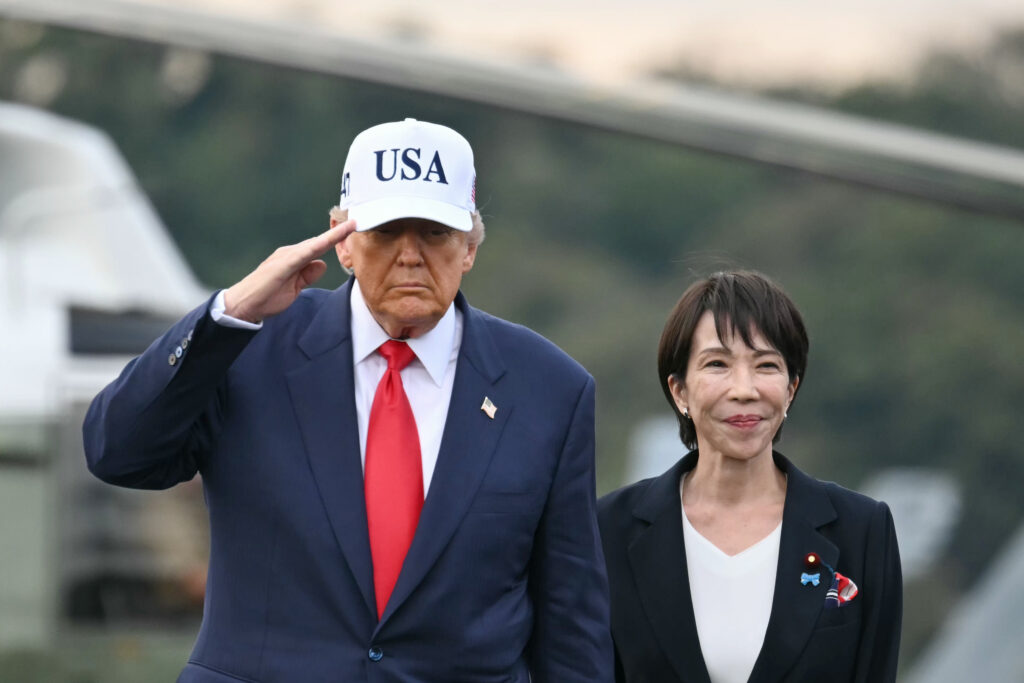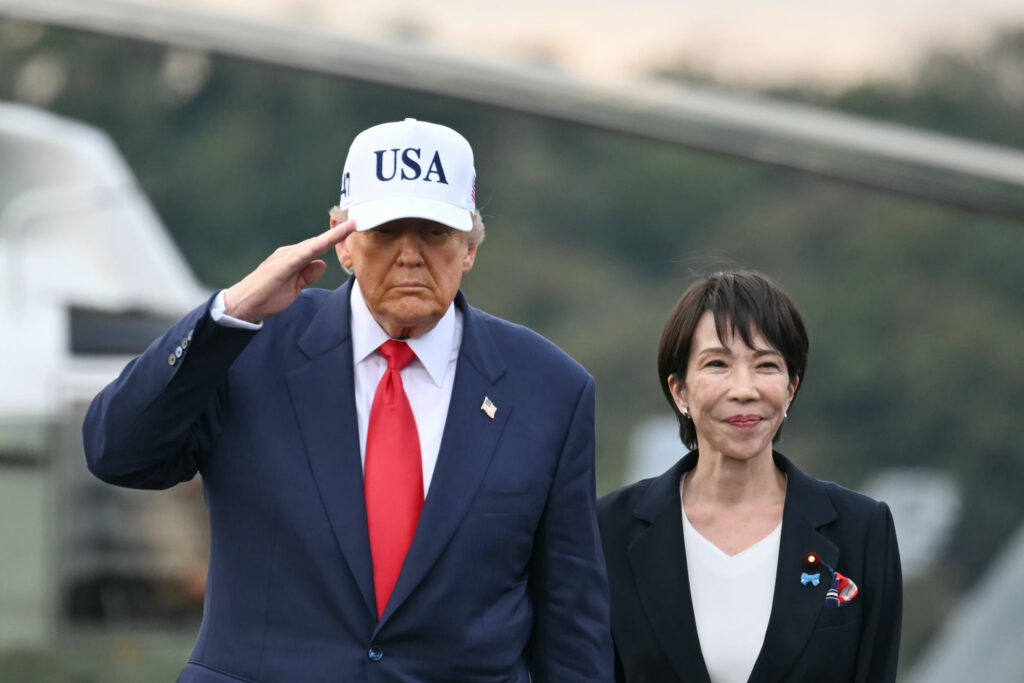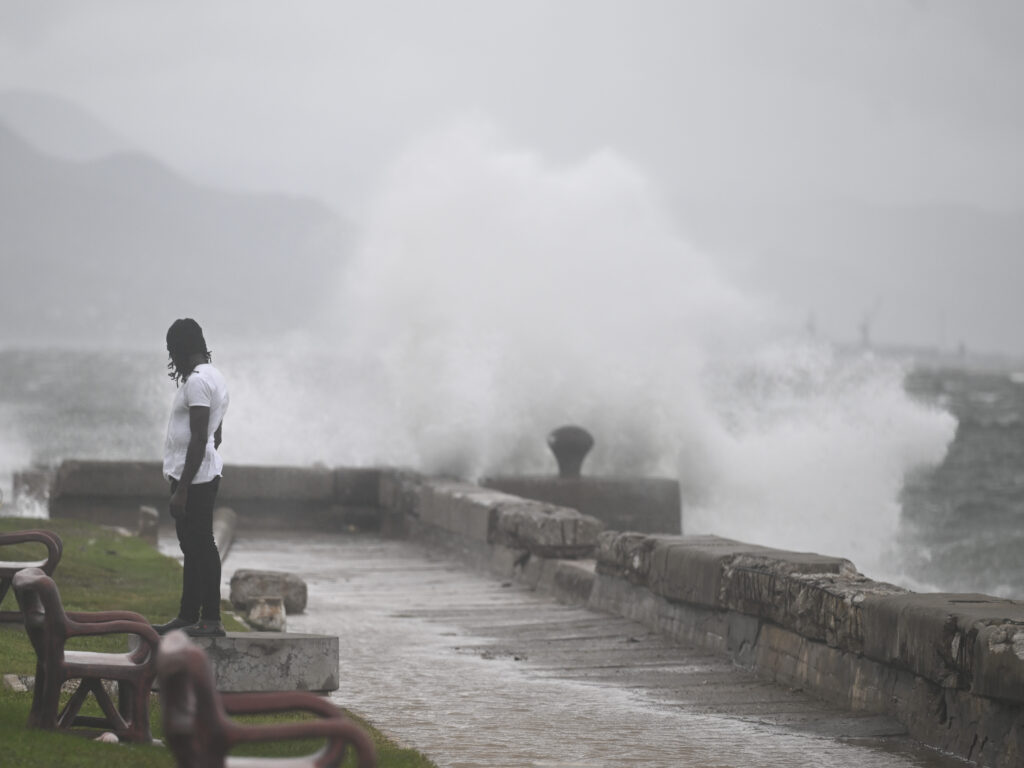Takaichi, Trump swap praise for ‘new golden age’ of ties
Japan’s new premier Sanae Takaichi lavished US leader Donald Trump with praise and vows of a “golden age” of ties on his visit to Tokyo Tuesday, before inking a deal with Washington aimed at securing critical minerals.Takaichi, Japan’s first woman prime minister, pulled out all the stops for Trump in her opening test on the international stage, and even announced she would nominate him for a Nobel Peace Prize.Trump has become increasingly focused on the Nobel since his return to power in January, and claims to have ended several conflicts around the world, a role that experts, however, downplay.In return for Takaichi’s plaudits, Trump, who was meeting the conservative premier for the first time on an Asia tour that aims for a deal with China, said Washington was an ally of the “strongest level”.”It’s a great honour to be with you, especially so early in what will be, I think, one of the greatest prime ministers,” Trump told Takaichi at the Akasaka Palace state guest house.Takaichi praised Trump’s efforts towards a ceasefire between Thailand and Cambodia and his “unprecedented historic achievement” of the Gaza truce deal.She also gifted him a golf bag signed by star player Hideki Matsuyama and a putter belonging to assassinated former prime minister Shinzo Abe, who had a close personal relationship with Trump, the White House said.”I would like to realise a new golden age of the Japan-US Alliance, where both Japan and the United States will become stronger and also more prosperous,” Takaichi said.- ‘Making ships’ -Speaking later alongside Trump on board the USS George Washington near Tokyo, Takaichi told a crowd of hundreds of sailors that she was “committed to fundamentally reinforce” Japan’s defence capabilities, noting her nation faces “unprecedented” security dangers.Trump, who came to the stage pumping his fist, waving and clapping as the audience cheered, said he had approved the first batch of missiles to be delivered to Japan’s Self-Defense Forces for their F-35 fighter jets and they would arrive this week.He also said the United States was going be working with Japan on “making ships”, as Commerce Secretary Howard Lutnick on Tuesday signed a deal to boost cooperation in shipbuilding.China dominates the global shipbuilding industry which has been in steady decline in the United States — but Trump has promised a revival of the sector.The two sides earlier signed an agreement aimed at “achieving resilience and security of critical minerals and rare earths supply chains”, a statement said.Beijing this month announced sweeping restrictions on the rare earths industry, prompting Trump to threaten 100 percent tariffs on imports from China in retaliation.Trump also squeezed in a meeting with families of Japanese people abducted by North Korea decades ago, where he said “the US is with them all the way” as they asked for help to find their loved ones.After years of denial, North Korea admitted in 2002 that it had sent agents to kidnap 13 Japanese people who were used to train spies in Japanese language and customs. Japan says it also abducted others.- China talks -On security, long-pacifist Japan is adopting a more muscular military stance as relations with China worsen.Takaichi, a China hawk, said her government would achieve its target of spending two percent of gross domestic product on defence this year — two years ahead of schedule.The United States, which has around 60,000 military personnel in Japan, wants Tokyo to spend even more, potentially matching the five percent of GDP pledged by NATO members in June.Most Japanese imports into the United States are subject to tariffs of 15 percent, less painful than the 25 percent first threatened.But the levies still contributed to a 24-percent slump in US-bound car exports in September in value terms year-on-year.Under the terms of a July trade deal shared by the White House, Japan is expected to invest $550 billion in the United States.The two sides said several investment projects were on the table, including up to $100 billion for the construction of nuclear reactors by the American company Westinghouse, involving Japanese suppliers and operators.Trump arrived in Tokyo on Monday for a visit sandwiched between a trip to Malaysia and a meeting in South Korea with Chinese counterpart Xi Jinping that could ease their bruising trade war.Trump is due to meet Xi on Thursday for their first face-to-face talks since the 79-year-old Republican’s return to office in January.
Takaichi, Trump swap praise for ‘new golden age’ of ties
Japan’s new premier Sanae Takaichi lavished US leader Donald Trump with praise and vows of a “golden age” of ties on his visit to Tokyo Tuesday, before inking a deal with Washington aimed at securing critical minerals.Takaichi, Japan’s first woman prime minister, pulled out all the stops for Trump in her opening test on the international stage, and even announced she would nominate him for a Nobel Peace Prize.Trump has become increasingly focused on the Nobel since his return to power in January, and claims to have ended several conflicts around the world, a role that experts, however, downplay.In return for Takaichi’s plaudits, Trump, who was meeting the conservative premier for the first time on an Asia tour that aims for a deal with China, said Washington was an ally of the “strongest level”.”It’s a great honour to be with you, especially so early in what will be, I think, one of the greatest prime ministers,” Trump told Takaichi at the Akasaka Palace state guest house.Takaichi praised Trump’s efforts towards a ceasefire between Thailand and Cambodia and his “unprecedented historic achievement” of the Gaza truce deal.She also gifted him a golf bag signed by star player Hideki Matsuyama and a putter belonging to assassinated former prime minister Shinzo Abe, who had a close personal relationship with Trump, the White House said.”I would like to realise a new golden age of the Japan-US Alliance, where both Japan and the United States will become stronger and also more prosperous,” Takaichi said.- ‘Making ships’ -Speaking later alongside Trump on board the USS George Washington near Tokyo, Takaichi told a crowd of hundreds of sailors that she was “committed to fundamentally reinforce” Japan’s defence capabilities, noting her nation faces “unprecedented” security dangers.Trump, who came to the stage pumping his fist, waving and clapping as the audience cheered, said he had approved the first batch of missiles to be delivered to Japan’s Self-Defense Forces for their F-35 fighter jets and they would arrive this week.He also said the United States was going be working with Japan on “making ships”, as Commerce Secretary Howard Lutnick on Tuesday signed a deal to boost cooperation in shipbuilding.China dominates the global shipbuilding industry which has been in steady decline in the United States — but Trump has promised a revival of the sector.The two sides earlier signed an agreement aimed at “achieving resilience and security of critical minerals and rare earths supply chains”, a statement said.Beijing this month announced sweeping restrictions on the rare earths industry, prompting Trump to threaten 100 percent tariffs on imports from China in retaliation.Trump also squeezed in a meeting with families of Japanese people abducted by North Korea decades ago, where he said “the US is with them all the way” as they asked for help to find their loved ones.After years of denial, North Korea admitted in 2002 that it had sent agents to kidnap 13 Japanese people who were used to train spies in Japanese language and customs. Japan says it also abducted others.- China talks -On security, long-pacifist Japan is adopting a more muscular military stance as relations with China worsen.Takaichi, a China hawk, said her government would achieve its target of spending two percent of gross domestic product on defence this year — two years ahead of schedule.The United States, which has around 60,000 military personnel in Japan, wants Tokyo to spend even more, potentially matching the five percent of GDP pledged by NATO members in June.Most Japanese imports into the United States are subject to tariffs of 15 percent, less painful than the 25 percent first threatened.But the levies still contributed to a 24-percent slump in US-bound car exports in September in value terms year-on-year.Under the terms of a July trade deal shared by the White House, Japan is expected to invest $550 billion in the United States.The two sides said several investment projects were on the table, including up to $100 billion for the construction of nuclear reactors by the American company Westinghouse, involving Japanese suppliers and operators.Trump arrived in Tokyo on Monday for a visit sandwiched between a trip to Malaysia and a meeting in South Korea with Chinese counterpart Xi Jinping that could ease their bruising trade war.Trump is due to meet Xi on Thursday for their first face-to-face talks since the 79-year-old Republican’s return to office in January.
Climat: la CEDH rejette un recours contre la Norvège
La Cour européenne des droits de l’homme (CEDH) a rejeté mardi un recours contre la Norvège au nom de la lutte contre le changement climatique, dans le cadre de la délivrance en 2016 de permis pétroliers dans l’Arctique.Ce jugement constitue un revers pour les défenseurs de la cause climatique, après l’arrêt rendu en 2024 contre la Suisse, accusée d’inaction face aux bouleversements du climat.Dans son arrêt de mardi, l’institution, basée à Strasbourg, estime qu’il n’y a pas eu violation de l’article 8 (droit au respect de la vie privée et familiale) de la Convention européenne des droits de l’homme.La CEDH avait été saisie il y a quatre ans par six jeunes militants norvégiens, ainsi que les branches locales des ONG de défense de l’environnement Greenpeace et Jeunes amis de la Terre.Les plaignants avaient aussi invoqué l’article 2 (droit à la vie) mais la cour n’a pas jugé “nécessaire” d’examiner leur requête sur ce point.Selon eux, l’Etat, avant d’accorder ces licences, “n’a pas procédé à une étude d’impact environnemental des effets potentiels de l’extraction pétrolière sur les obligations de la Norvège en matière d’atténuation du changement climatique”.L’arrêt reconnaît à ce sujet que “l’évaluation des incidences réalisée lors des processus ayant abouti à la décision de 2016 n’était pas réellement exhaustive”.Un point salué par Sigrid Hoddevik Losnegård, vice-présidente de Jeunes Amis de la Terre Norvège, satisfaite que “la Cour ait conclu que l’Etat doit évaluer les émissions globales liées à la combustion d’hydrocarbures avant d’approuver un nouveau champ pétrolier”.”Cela aura des conséquences importantes sur la façon dont on gère les activités pétrolières en Norvège”, a-t-elle déclaré à l’AFP.- Bras de fer judiciaireEn revanche, la CEDH n’a pas retenu l’argument selon lequel Oslo a omis de remplir son “obligation de protéger effectivement les individus contre les effets néfastes graves du changement climatique sur leur vie, leur santé, leur bien-être et leur qualité de vie”.Premier producteur de pétrole et de gaz d’Europe occidentale, la Norvège est régulièrement mise en cause pour son exploitation des hydrocarbures, source de prospérité mais aussi de dérèglement climatique.”La Cour établit clairement que nous ne violons pas les droits de l’homme”, s’est félicité le ministre norvégien de l’Energie Terje Aasland dans un courriel à l’AFP.L’Etat se contente “de chiffrer les émissions” générées par la combustion des hydrocarbures, mais sans se pencher sur leurs “conséquences concrètes (…), à savoir combien de gens en plus vont mourir, combien de glace en plus va fondre, combien d’événements météorologiques extrêmes en plus va-t-on avoir à cause d’elles”, a critiqué de son côté Frode Pleym, leader de Greenpeace Norvège.Cette décision est le point d’orgue d’une longue bataille judiciaire. Le 10 juin 2016, le ministère de l’Énergie norvégien accorde à 13 sociétés privées, parmi lesquelles le champion national Statoil (rebaptisé depuis Equinor), les américains Chevron et ConocoPhillips et le russe Lukoil, 10 licences d’exploration sur le plateau continental norvégien.S’appuyant à l’époque sur l’Accord de Paris qui vise à limiter à moins de 2°C le réchauffement climatique, les ONG font appel à la justice locale, jugeant cette attribution contraire à l’article 112 de la Constitution garantissant à chacun le droit à un environnement sain. A chaque fois, les tribunaux tranchent en faveur des autorités.- Précédent suisse -Les plaignants se tournent alors vers la CEDH, dont la mission de protéger les droits fondamentaux en Europe. Entre-temps, aucun gisement de gaz potentiellement rentable n’ayant été découvert, les sociétés ont restitué les licences. En 2024, la cour a rendu un arrêt historique en condamnant pour la première fois un Etat pour son manque d’action face au changement climatique, en l’occurrence la Suisse, poursuivie par une association.Cette décision est appelée à faire jurisprudence dans les 46 Etats membres du Conseil de l’Europe.Et en juillet, la Cour internationale de justice (CIJ) a adopté un avis consultatif stipulant que les Etats qui violent leurs obligations climatiques commettent un acte “illicite” et pourraient se voir réclamer des réparations par les pays les plus affectés.La CIJ avait particulièrement visé l’octroi de permis d’exploration ou de subventions pour les combustibles fossiles.
Climat: la CEDH rejette un recours contre la Norvège
La Cour européenne des droits de l’homme (CEDH) a rejeté mardi un recours contre la Norvège au nom de la lutte contre le changement climatique, dans le cadre de la délivrance en 2016 de permis pétroliers dans l’Arctique.Ce jugement constitue un revers pour les défenseurs de la cause climatique, après l’arrêt rendu en 2024 contre la Suisse, accusée d’inaction face aux bouleversements du climat.Dans son arrêt de mardi, l’institution, basée à Strasbourg, estime qu’il n’y a pas eu violation de l’article 8 (droit au respect de la vie privée et familiale) de la Convention européenne des droits de l’homme.La CEDH avait été saisie il y a quatre ans par six jeunes militants norvégiens, ainsi que les branches locales des ONG de défense de l’environnement Greenpeace et Jeunes amis de la Terre.Les plaignants avaient aussi invoqué l’article 2 (droit à la vie) mais la cour n’a pas jugé “nécessaire” d’examiner leur requête sur ce point.Selon eux, l’Etat, avant d’accorder ces licences, “n’a pas procédé à une étude d’impact environnemental des effets potentiels de l’extraction pétrolière sur les obligations de la Norvège en matière d’atténuation du changement climatique”.L’arrêt reconnaît à ce sujet que “l’évaluation des incidences réalisée lors des processus ayant abouti à la décision de 2016 n’était pas réellement exhaustive”.Un point salué par Sigrid Hoddevik Losnegård, vice-présidente de Jeunes Amis de la Terre Norvège, satisfaite que “la Cour ait conclu que l’Etat doit évaluer les émissions globales liées à la combustion d’hydrocarbures avant d’approuver un nouveau champ pétrolier”.”Cela aura des conséquences importantes sur la façon dont on gère les activités pétrolières en Norvège”, a-t-elle déclaré à l’AFP.- Bras de fer judiciaireEn revanche, la CEDH n’a pas retenu l’argument selon lequel Oslo a omis de remplir son “obligation de protéger effectivement les individus contre les effets néfastes graves du changement climatique sur leur vie, leur santé, leur bien-être et leur qualité de vie”.Premier producteur de pétrole et de gaz d’Europe occidentale, la Norvège est régulièrement mise en cause pour son exploitation des hydrocarbures, source de prospérité mais aussi de dérèglement climatique.”La Cour établit clairement que nous ne violons pas les droits de l’homme”, s’est félicité le ministre norvégien de l’Energie Terje Aasland dans un courriel à l’AFP.L’Etat se contente “de chiffrer les émissions” générées par la combustion des hydrocarbures, mais sans se pencher sur leurs “conséquences concrètes (…), à savoir combien de gens en plus vont mourir, combien de glace en plus va fondre, combien d’événements météorologiques extrêmes en plus va-t-on avoir à cause d’elles”, a critiqué de son côté Frode Pleym, leader de Greenpeace Norvège.Cette décision est le point d’orgue d’une longue bataille judiciaire. Le 10 juin 2016, le ministère de l’Énergie norvégien accorde à 13 sociétés privées, parmi lesquelles le champion national Statoil (rebaptisé depuis Equinor), les américains Chevron et ConocoPhillips et le russe Lukoil, 10 licences d’exploration sur le plateau continental norvégien.S’appuyant à l’époque sur l’Accord de Paris qui vise à limiter à moins de 2°C le réchauffement climatique, les ONG font appel à la justice locale, jugeant cette attribution contraire à l’article 112 de la Constitution garantissant à chacun le droit à un environnement sain. A chaque fois, les tribunaux tranchent en faveur des autorités.- Précédent suisse -Les plaignants se tournent alors vers la CEDH, dont la mission de protéger les droits fondamentaux en Europe. Entre-temps, aucun gisement de gaz potentiellement rentable n’ayant été découvert, les sociétés ont restitué les licences. En 2024, la cour a rendu un arrêt historique en condamnant pour la première fois un Etat pour son manque d’action face au changement climatique, en l’occurrence la Suisse, poursuivie par une association.Cette décision est appelée à faire jurisprudence dans les 46 Etats membres du Conseil de l’Europe.Et en juillet, la Cour internationale de justice (CIJ) a adopté un avis consultatif stipulant que les Etats qui violent leurs obligations climatiques commettent un acte “illicite” et pourraient se voir réclamer des réparations par les pays les plus affectés.La CIJ avait particulièrement visé l’octroi de permis d’exploration ou de subventions pour les combustibles fossiles.
Giant Hurricane Melissa hours from bullseye hit on Jamaica
Hurricane Melissa was only hours away Tuesday from expected landfall on Jamaica, bringing devastating flooding and winds that officials warn will smash the small Caribbean nation’s infrastructure.Evacuations were underway as the slow-moving Category 5 storm — potentially the biggest ever to hit Jamaica — crept forward.Four deaths — three in Jamaica and one in Haiti — have already been blamed on the deteriorating conditions but officials were concerned that many people were ignoring pleas to get to safety.In the worst-hit areas, said Jamaican Prime Minister Andrew Holness, “I don’t believe there is any infrastructure within this region that could withstand a Category 5 storm.””For Jamaica it will be the storm of the century so far,” Anne-Claire Fontan, at the World Meteorological Organization, said.The US National Hurricane Center (NHC) reported early on Tuesday that Melissa was about 115 miles (185 kilometers) from the Jamaican capital Kingston, reaching maximum wind speed of 175 miles (280 kilometers) per hour.Surging ocean, together with rainfall expected to be measured in feet not inches, will likely trigger deadly floods.But officials were worried that many had refused to heed evacuation calls.Local government minister Desmond McKenzie said late Monday that many of the island’s 880-odd shelters remained empty.”I want to urge persons… to get to high ground as quickly as possible,” he said.Roy Brown, a plumber and tiler, told AFP he’d had bad experiences in government shelters during previous hurricanes and was “not moving.””I don’t believe I can run from death,” he said.- Lumbering giant -Melissa was forecasted to reach the nearby eastern end of impoverished Cuba late Tuesday after pummeling Jamaica.The Jamaican Red Cross, which was distributing drinking water and hygiene kits ahead of infrastructure disruptions, said Melissa’s “slow nature” made the anxiety worse.The hurricane was creeping along at human walking pace, meaning there will be no quick relief once it hits, likely lingering over the tropical island renowned for tourism, sprint star Usain Bolt and reggae.”You anticipate that maybe within four hours it would be gone… but Melissa is not looking like that,” Red Cross spokesperson Esther Pinnock told AFP.Up to 40 inches (one meter) of rainfall were forecasted, with flash flooding and landslides also expected in Haiti, the Dominican Republic and Cuba.A “life-threatening” storm surge is likely along Jamaica’s southern coast, with waters potentially rising 13 feet (4 meters), along with “destructive waves,” the NHC said.There were fears that Melissa will wreak devastation on par with historic hurricanes, including 2017’s Maria or 2005’s Katrina, which left indelible impacts on Puerto Rico and the US city of New Orleans, respectively.Scientists say human-driven climate change has exacerbated massive storms, increasing their frequency.- Global warming -Meteorologist Kerry Emanuel said global warming was causing more storms to rapidly intensify as Melissa did, raising the potential for enormous rains.”Water kills a lot more people than wind,” he told AFP.The last major hurricane to impact Jamaica was Beryl in July 2024 — an abnormally strong storm for the time of year.”Human-caused climate change is making all of the worst aspects of Hurricane Melissa even worse,” said climate scientist Daniel Gilford.
Amazon cuts staff by 14,000
US online retail and cloud computing giant Amazon said Tuesday that it is reducing its workforce by 14,000 posts to streamline operations as it invests in artificial intelligence, without saying where the cuts will be made. Amazon said the reductions were a continuation of efforts “to get even stronger by further reducing bureaucracy, removing layers, and shifting resources to ensure we’re investing in our biggest bets and what matters most to our customers’ current and future needs.””While this will include reducing in some areas and hiring in others, it will mean an overall reduction in our corporate workforce of approximately 14,000 roles,” said the statement signed by senior vice-president Beth Galetti. Galetti called AI “the most transformative technology we’ve seen since the Internet,” adding that “it’s enabling companies to innovate much faster than ever before.” On Monday, American media reported had that large-scale layoffs were on the way at the online retailer, citing a worldwide total of 30,000 job cuts over several months. According to the reports, the cuts would target areas such as human resources, advertising, and management in a group that has 350,000 office positions, out of a total of more than 1.5 million employees.Warehouse workers, who make up the majority of Amazon’s workforce, will likely not be affected, according to Galetti, who indicated that Tuesday’s job cuts were just a first step.”Looking ahead to 2026, we expect to continue hiring in key strategic areas while also finding additional places we can remove layers, increase ownership, and realize efficiency gains,” she said.Amazon chief executive Andy Jassy has lauded the potential of AI to streamline workplace operations, from engaging with customers online to making offices more efficient.”Our conviction that AI will change every customer experience is starting to play out,” Jassy said during Amazon’s last quarterly earnings call.Amazon will next report earnings on Thursday, and is among the tech titans under pressure to show the merit of huge investments in AI.Amazon will also likely be pressed for details about a recent AWS outage. Popular internet services ranging from streaming platforms to messaging services to banking were offline for hours last week due to an outage in Amazon’s crucial cloud network, illustrating the extent to which internet life depends on the tech titan.
Amazon supprime 14.000 postes, première étape d’un mouvement d’ampleur
En annonçant mardi la suppression de 14.000 postes, le géant américain du commerce en ligne Amazon engage un mouvement d’ampleur intimement lié au développement de l’intelligence artificielle et amené à se poursuivre dans les prochains mois.Après les paroles, les actes: en juin dernier, le patron d’Amazon Andy Jassy avait affiché sa volonté de réduire les coûts, en pleine course aux investissements dans l’intelligence artificielle. Cela s’est traduit, mardi, par une première vague de suppression de 14.000 postes, sans préciser dans quels pays.Ces réductions “s’inscrivent dans la continuité (des) efforts pour devenir plus fort encore, en réduisant davantage la bureaucratie, en supprimant des niveaux (hiérarchiques) et en réaffectant des ressources”, a écrit Beth Galetti, vice-présidente chargée des ressources humaines et de la technologie, dans une déclaration publiée sur le site d’Amazon.”Cela impliquera des réductions dans certains domaines et des recrutements dans d’autres, mais cela se traduira par une réduction globale d’environ 14.000 postes dans l’effectif des bureaux” d’Amazon, a-t-elle annoncé, à deux jours de la publication des résultats trimestriels de l’entreprise.Lundi, plusieurs médias américains avaient rapporté que ce mouvement d’ampleur pourrait toucher 30.000 postes sur plusieurs mois. Ces suppressions visent, selon eux, des fonctions de support ou stratégiques (ressources humaines, publicité, cadres, etc.), dans un groupe qui compte 350.000 postes de bureaux, sur un total de plus de 1,5 million de salariés. La main d’oeuvre des entrepôts, qui est majoritaire dans les effectifs, ne sera a priori pas touchée, selon Beth Galetti, qui évoque des coupes dans les emplois de bureaux.- D’autres annonces attendues en 2026 -Elle a laissé entendre que ces 14.000 postes n’étaient qu’une étape avant, en 2026, “de continuer à recruter dans des domaines stratégiques clés tout en identifiant d’autres occasions de supprimer des (postes), accroître la responsabilité et améliorer l’efficacité”.Anticipant les critiques (“Certains se demanderont pourquoi nous réduisons des postes alors que l’entreprise se porte bien”), Beth Galetti a lié cette décision à l’IA générative : “Ce qu’il faut garder à l’esprit, c’est que le monde évolue rapidement. Cette génération d’IA est la technologie la plus transformative que nous ayons vue depuis Internet, et elle permet aux entreprises d’innover beaucoup plus vite qu’auparavant”.En juin, le directeur général d’Amazon, Andy Jassy, avait annoncé que le développement de l’IA allait, “dans les prochaines années (…) réduire nos effectifs de bureaux”.Débuté en 2021, le mandat d’Andy Jassy a déjà été marqué par un mouvement similaire, avec 27.000 suppressions de postes lors de l’hiver 2022-2023.Amazon dit “soutenir” les personnes concernées et offrira à “la plupart” d’entre elles 90 jours pour rechercher un nouveau poste en interne. Ce délai “pourra varier selon les lois locales”, précise Beth Galetti, indiquant que le mouvement ne devrait pas se cantonner aux Etats-Unis.”La hausse des prix, un marché du travail plus tendu et les aléas de la guerre commerciale menée par le président Trump ont poussé les chefs d’entreprise à chercher des moyens de se serrer la ceinture sans nuire à la croissance”, analysait lundi le Wall Street Journal.Les interrogations sur l’avenir des ouvriers de l’entreprise, 2e employeur aux Etats-Unis avec 1,2 million de salariés, se pose aussi dans les entrepôts, où Amazon accélère l’automatisation. Selon le New York Times, Amazon pourrait renoncer à plus de 160.000 embauches d’ici 2027.D’importantes suppressions d’emplois chez les cols-blancs ont aussi lieu chez d’autres géants américains de la tech, avec notamment 15.000 départs prévus chez Microsoft.






